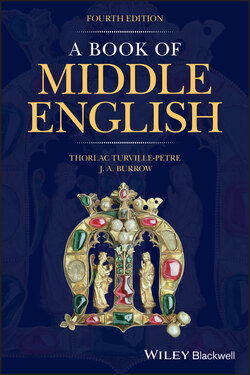Читать книгу A Book of Middle English - J. A. Burrow - Страница 73
5.6.5 The Infinitive
ОглавлениеThe infinitive form is used on its own, with to or with for to. The practice of using the plain infinitive or the infinitive with to is for the most part the same as in Modern English, though there are some differences in detail. The plain infinitive is used directly after auxiliary verbs such as shall, will, can, may, mot, and others such as dare and let etc.: ich nolde don, ‘I would not do’, 2/159; his hors he lette irnen, ‘he let his horse run’, 3/60. With some other verbs such as gin, go, here, þink, etc., where Modern English has the infinitive with to, Middle English may have a plain infinitive: cleopien agon, ‘began to call’, 3/132; þohte forð siðen and over sæ liðen, ‘intended to go forth and (to) travel over the sea’, 3/85; þee byhoveþ … riʒt so put, ‘it will be necessary for you … just so to put’, 6/181–2. With a pair of infinitives, the first may be without and the second with to, and this is different from modern usage: lovede wel fare / And no dede to do, ‘loved to live well and do nothing’, 7a/8–9; here schulde wight men worschippe wynne / And noght with gaudis al day to gone, ‘here should bold men win honour and not go …’, 15/199–200.
The infinitive may have a passive sense: avantarie is to despise, ‘boasting is to be despised’, 13/58; nas no coumfort to kever, ‘there was no comfort to be obtained’, 8/223; ha beoð þe leasse to meanen, ‘they are the less to be pitied’, 4/25–6. Verbs of commanding and the like may be followed by an infinitive with passive sense: bede unlouke þe lidde, ‘ordered the lid to be released’, 11/67; he let ordeine, ‘he caused orders to be given’, 13/106; late bere, ‘cause to be carried’, hence ‘carry!’, 15/178; do dryve out a decré, ‘have a decree issued’, 8/386; the Jewes leet he bynde, ‘he had the Jews bound’, 18b/168.
The verb come can be followed by the infinitive of another verb of motion defining the manner or direction in which the coming takes place: þenne comeð þe wulf wilde touward hire winden, ‘then the wild wolf comes moving towards her’, 3/98.
The construction with the infinitive as a complement is commoner than in Modern English, and is used where we might use the ‘‐ing’ form: Arður isæh Colgrim climben, ‘Arthur saw Colgrim climb(ing)’, 3/86; iherde ich holde grete tale / An hule and one niʒtingale, ‘I heard an owl and a nightingale conducting a great argument’, 2/3–4.
After an auxiliary verb, the infinitive be is occasionally omitted: oþir trowid ever shulde, ‘or was believed ever likely (to be)’, 11/255. On the much commoner omission of infinitive verbs of motion, see 5.6.9.
The infinitive with for to originally expressed purpose, as in: com to him for to here, ‘came in order to hear him’, 5/440. Increasingly it became used as an equivalent of the to infinitive, sometimes for reasons of metre and rhythm: ne wonde / þis aventure for to frayn, ‘do not hesitate to attempt this adventure’, 9/488–9; he may noʒt hure speche vor to lurne, ‘he is unable to learn their speech’, 12/5.
